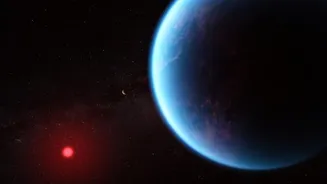Here are today’s most important updates from the realm of Science and Space.
NASA Finds Potential Life Signals on Distant Aquatic Exoplanet
Using the James Webb Space Telescope (JWST), researchers have detected chemical
traces in the atmosphere of a distant world known as K2-18b, a planet nearly 124 light years away. The telescope identified dimethyl sulphide (DMS) and dimethyl disulphide (DMDS), gases that on Earth are almost exclusively produced by living microbes such as algae. K2-18b, about 2.5 times the size of Earth, sits in its star's "habitable zone", the orbital distance where liquid water could exist at the surface. That, combined with the detection of these gases, suggests the possibility that the planet could host a thriving biosphere, perhaps even global oceans.
From Dust to Destiny: First-Ever Image of a Planet’s Birth Captivates Scientists

An international team of astronomers has made the unexpected discovery of a new planet. Detected at an early stage of formation around a young analog of our own Sun, the planet is estimated to be about 5 million years-old and most likely a gas giant of similar size to Jupiter. The ground-breaking discovery was made using one of the world's most advanced observatories -- the European Southern Observatory's Very Large Telescope (ESO's VLT) in the Atacama Desert in Chile. The new planet has been named WISPIT 2b. It is only the second time a confirmed planet has been detected at this early evolutionary stage around a young version of our Sun.
Silent Shrinking: Lakes Across India Are Drying Up

Between 1992 and 2020, more than 30 major Indian lakes have recorded a drying trend. 16 of these lakes are in southern India, including well-known reservoirs like Mettur, Krishnarajasagar, and Nagarjuna Sagar. Lakes, once the lifeline of cities and villages, are drying at an alarming pace. Along with maintaining biodiversity, lakes help in climate mitigation by absorbing floodwater and storing carbon. Lakes cover just 3 per cent of the Earth’s land area, but hold 90 per cent of our planet’s freshwater. Experts point to unplanned urbanisation, agricultural expansion, industrialisation, and sewage dumping as leading causes of dying lakes.
Garden of Light: Scientists Grow Multicolored Succulents That Glow All Night

Scientists have created rainbow, glow-in-the-dark succulents by injecting colourful "afterglow" particles into the leaves that absorb, and then gradually release, light. The luminescent succulents shone for up to two hours, according to the study. The invention paves the way for sustainable, plant-based lighting to illuminate outdoor and indoor spaces, researchers said. Luminescent succulents could one day be a low-carbon lighting solution, according to the study. The researchers hope to produce the same effect in other plants, which could be exposed to sunlight and charged up like batteries to provide decorative and practical lighting.














